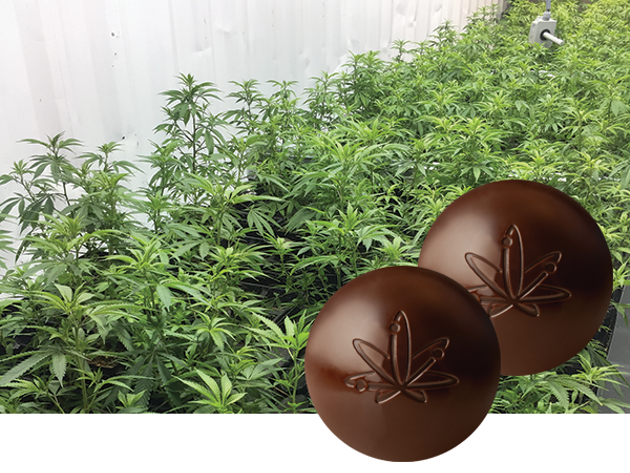How Atlantic Canadian companies are tackling Cannabis 2.0

In the last week of January, a month after edibles arrived at the NSLC, the Clyde Street store was mostly bare of them. No chocolates, no gummies. The cases of THC-infused beverages were empty. There were three flavours of CBD-infused tea bags from Everie (from High Park) in stock, as well as a number of vape cartridges, including one from Reef (from Nova Scotia's Aqualitas). But that was about it.
That should change sooner rather than later, however.
In October 2018, just after the first round of cannabis legalization, Canadian cannabis companies immediately began working on what they knew was coming next: Cannabis 2.0, or, edibles.
Along with cookies, candies and gummies, the category also includes products like infused tea, topicals, vape pens and other concentrates, and even THC powder.
"The concept of Cannabis 2.0 can't be understated in terms of how big of an opportunity it is for our industry," says Ray Gracewood, senior VP of marketing and communications at Organigram, one of the largest licensed cannabis producers in Atlantic Canada. Gracewood has been at the Moncton-based company since 2016 and says that its edibles play will be particularly focused on infused chocolate.
"We have experience within our executive team in manufacturing chocolate," says Gracewood. That was "a big factor in us deciding to really double down" on that area, aiming to make not just the best infused chocolate, but great chocolate, period.
Organigram's bars will be sold on the recreational market under the Edison and Trailblazer brands, including flavours like coffee and mint, as well as chocolate truffles called Edison Bytes. Organigram says its chocolate will be on store shelves soon—we'll have an update next week online.
Timelines are generally hard to predict, because Health Canada's 60-day product approval period means licensed producers must submit an application for each new product. After approval, retailers like the NSLC still have to place an order, wait to receive it and inventory it. "We expect a very limited selection, with a gradual introduction of products," says Beverly Ware, communications advisor for the NSLC.
But the Health Canada approval is just the final step of a process that can take years of research, taste-test panels and evaluation.
Myrna Gillis, founder and CEO of organically certified Nova Scotia cannabis company Aqualitas, says her company turned to testing at Acadia University's food and beverage labs—including sensory panels where individuals would taste them, smell them and even evaluate texture. As a result, Aqualitas' Cannabis 2.0 products will likely be released a bit later in 2020, by June.
The company sells on the recreational market as Reef, and Gillis says their line of products will include infused kombucha, gum, chocolate and gummies. Both Aqualitas and Organigram also plan to sell THC-infused drink powder.
"It starts to add a whole different level of convenience and discretion, specifically among consumers who are just not into the idea of smoking," says Gracewood.
But all of these products will have to be limited to 10mg of THC per retail unit. For a four-pack of chocolate truffles, that's just 2.5mg each.
The difference between the 10mg chocolate bars from Organigram and the 80-100mg bars on the black market, Gracewood says, is that the former's contents and effects are guaranteed.
"Right now, there's a relative unknown in terms of onset time," he says, explaining that the company doesn't want consumers to "sign themselves up for a ride that they didn't want to get signed up for...we want to make sure that before we enter those products to market that we just have a really precise idea of how they'll respond in the body," says Gillis.
Gracewood and Gillis are confident about their success once the products hit the market, but they also acknowledge the approval processes is part of ensuring quality.
"I think everybody's kind of resigned themselves to the fact that it will take time to roll out," says Gracewood.
And in Nova Scotia especially, the products are expected to be well-received, both for consumers new to cannabis and trying edibles for the first time, or to old pros just getting into vapes.
"I find that the Nova Scotia market is a really very knowledgeable consumer, which is great for brands and products that are high quality," Gillis adds. "We have among the highest per capita consumption in the country here, and we have a lot of very mature cannabis consumers who know exactly what they want."
420 Intel is Your Source for Marijuana News
420 Intel Canada is your leading news source for the Canadian cannabis industry. Get the latest updates on Canadian cannabis stocks and developments on how Canada continues to be a major player in the worldwide recreational and medical cannabis industry.
420 Intel Canada is the Canadian Industry news outlet that will keep you updated on how these Canadian developments in recreational and medical marijuana will impact the country and the world. Our commitment is to bring you the most important cannabis news stories from across Canada every day of the week.
Marijuana industry news is a constant endeavor with new developments each day. For marijuana news across the True North, 420 Intel Canada promises to bring you quality, Canadian, cannabis industry news.
You can get 420 Intel news delivered directly to your inbox by signing up for our daily marijuana news, ensuring you’re always kept up to date on the ever-changing cannabis industry. To stay even better informed about marijuana legalization news follow us on Twitter, Facebook and LinkedIn.




